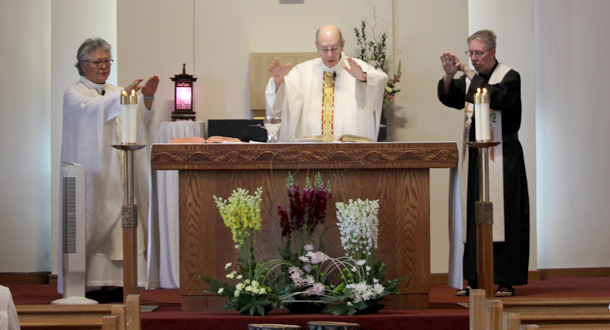
Scripture:
Deuteronomy 8:2-3, 14b-16a
1 Corinthians 10:16-17
John 6:51-58
Reflection:
The Mass as Dangerous Memory
There is memory.
And there is dangerous memory.
How do these two terms differ? And what relevance do they have with today’s feast, The Solemnity of the Body and Blood of Christ, a feast that calls us to focus on two manifestations of the Body of Christ, the Holy Eucharist, and the Church?
First, since the earliest centuries, the Church has spoken of the elements used in celebrating the Eucharist as being changed into the body and blood of Christ. Indeed, the Church teaches that “the Eucharist is the source and summit of the Christian life” (no. 1324, CCC).
This teaching, that the bread and wine in the Eucharist become the Real Presence, body blood, soul, and divinity of Jesus Christ (no. 1374, CCC), is a central tenet of our faith. However, according to a 2019 Pew Research Center survey, most Catholics do not believe this core teaching. Specifically, nearly 7 in 10, (69 percent), say they believe that the bread and wine used in Communion are merely symbols of the body and blood of Jesus.
Sadly, for these Catholics, the Eucharist – and the Mass itself – is simply memory. The bread and wine serve as symbols to remind us of the Last Supper and the death of Jesus 2,000 years ago. That is memory, not unlike the way we remember our nation’s Declaration of Independence on July 4, 1776. We remember and we celebrate that which took place nearly 250 years ago.
The Pew survey also found that only 31 percent of Catholics believe “that during Mass, the bread and wine actually become the body and blood of Jesus.”
They embrace dangerous memory.
Yes, we remember what Jesus did 2,000 years ago. But equally important, that memory is made present in the Real Presence of the Eucharist. We remember that Jesus is present, right now among us. The theological term for this memory is the Greek word, anamnesis. Anamnesis explains why the Church has always taught that Christ is not re-sacrificed at each Mass, but that we enter that one moment when Jesus defeated evil’s strongest consequence – death.
Anamnesis means that the memory of the past becomes the memory of the present. We may even think of this Eucharistic moment as a liminal experience – that space where we mortals occupy both sides of a boundary between time and timelessness, that moment that holds both the past and present as one. It is that moment when the priest, in persona Christi, acting in the person of Christ, speaks the sacred words, “This is my body,” and “this is my blood. Do this in memory of me.”
This memory is dangerous because it urges us to act, to make inconvenient, even dangerous choices. Jesus made his choice, most agonizingly at Gethsemane. “Not my will, but yours be done,” Jesus declared in the garden. Choosing for God led Jesus to the cross.
This Eucharistic meal, this Messianic Banquet, this Real Presence, brings the Church together in communion to share in this salvific living bread, calling us to join in solidarity with those who today suffer, and who in the past have suffered persecution, unjust treatment and death, the poor of God. That is the meaning of dangerous memory as 20th-century theologian Johann Baptist Metz described the term.
The Eucharist is not solely a matter of personal, feel-good, devotional memory – that certainly can be a good and comforting experience for the faithful. But it cannot stop there. The Eucharist, the body and blood of Jesus Christ, challenges us to choose what we stand for, with whom we stand, and in what we stand against. The Apostol Paul says it best. “Do not be conformed to this world, but be transformed by the renewing of your mind” (Rom. 12:2).
That is also the moment, at the conclusion of Mass, when the Church is sent out in mission, “The Mass is ended. Go out to serve God and one another.” It is time to act, to build up God’s kingdom here on earth – against all odds, against all opposition.
That is dangerous memory.
Deacon Manuel Valencia is on the staff at Mater Dolorosa Passionist Retreat Center, Sierra Madre, California.
